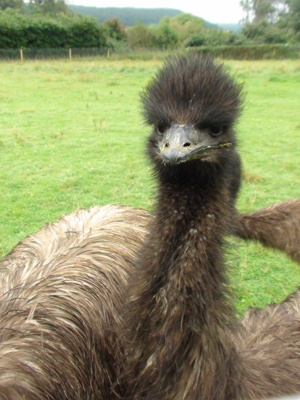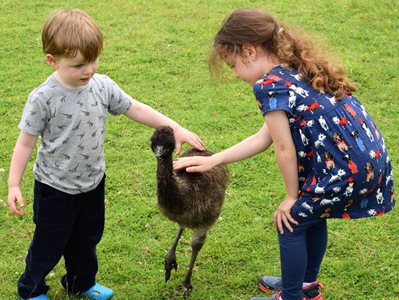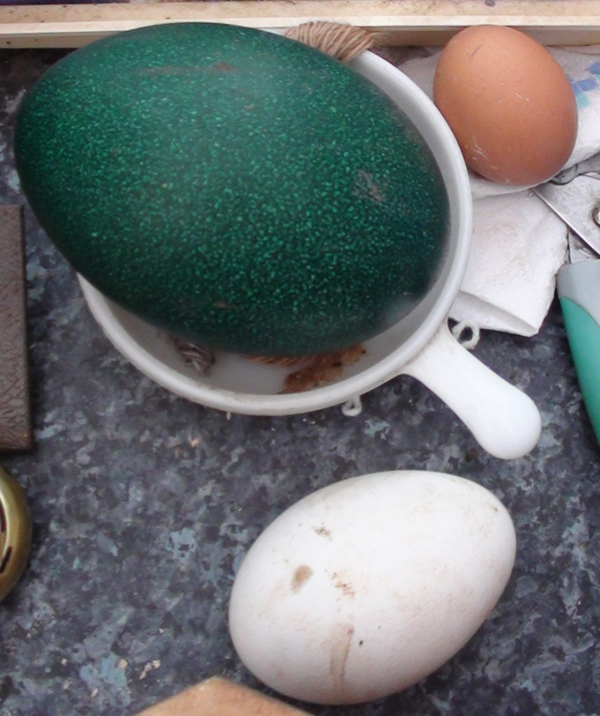
Emus are large Australian birds from the ratite family. They are naturally inquisitive, and when hand-reared they are generally friendly and will come to be stroked and fed. Despite common myths, emus are not aggressive and do not require a Dangerous Wild Animal licence in the UK. While emus are very unlikely to hurt people under normal circumstances, they can be difficult and potentially dangerous to physically restrain, for example if vet treatment is required, and are often problematic if you have to move them. The main risk is that emus seem to employ a strategy of falling to the ground and thrashing and flailing on their backs when panicked or when feeling exuberant. They have extremely powerful legs and sharp claws and can inflict pretty nasty lacerations if they do this near a person. Emus are also incredibly stupid (essentially they are little more than dinosaurs, despite having survived several historical attempts to exterminate them in their native land, some of which involved machine guns!). Their stupidity means emus can't easily be trained to load as most livestock can, and they tend to spook at unfamiliar objects like vehicles. They do not herd and cannot be worked with dogs. Owners should also be be aware that adults with young (in this case, it is the male who incubates the eggs and cares for the chicks) can be protective, and that any big animal that is frightened, trapped, or in pain can injure someone trying to help it. Even a well-socialised adult emu is not a safe animal for young children to be around.

Chicks are harmless and appealing to children, but even when well socialised, a mature emu could inadvertently injure a person with its claws and they should not be trusted around the very young.
Emus' inquisitiveness and very limited ability to learn can make them a nuisance to have in a field where you need to enter regularly to work with other animals, as they get in the way and have an annoying habit of creeping around behind people and playing with any tools and items that are brought in. They defecate frequently and voluminously and tend to pace the fenceline and wear out the ground at the perimeter of the field, which turns it into a quagmire in the wetter months of the year. They have little or no 'homing instinct' and in the wild spend their time wandering in the bush. For this reason, if you're thinking of keeping some, it's really worth considering your fencing and the area you intend to keep them carefully beforehand. Parkland environments with other low-maintenance game such as deer are probably ideal for them whereas paddocks with conventional livestock may not be (although they seem to be indifferent to pretty much any other livestock). Emus can jump, so perimeter fencing needs to be at least 5 foot high, and it's also vital to be aware that emus are very good swimmers and won't see bodies of water as a boundary. The emus should be moved to their permanent location before they become too large for you to safely restrain and carry them.

Looks awesome, tastes bloody awful
Emus lay enormous dark-green eggs during the winter months, and part of the original reason we acquired them was in order to have eggs to eat at a time of year when most other eggs are scarce. While the eggs are a thing of beauty and great intrigue, we and everyone we know who tried them agreed they were the worst-tasting egg they'd ever eaten. We tried them boiled, as an omelette, scrambled, and made into a huge Scotch egg baked in the oven. In all cases the results were pallid and flaccid with very little flavour and an unpleasant soggy texture. Chickens, turkeys, geese, and ducks all produce eggs that are far more palatable, and as the laying season wore on and the novelty wore off for all our friends and family, we found we had more eggs than we wanted or knew what to do with.
The chicks are bizarre, fascinating, and hugely appealing, and when they hatch they smell like wet dogs and are nothing like any other chick I've ever encountered.
Odette learning about food and water
Emus are monogamous and should ideally live in opposite-sex pairs or mixed groups if in large paddocks, to avoid females fighting over males at mating season. As emus are difficult to catch and restrain, successful veterinary treatment cannot be relied upon, and escapes of mature birds are a potential risk to the public, it is also worthwhile knowing someone with a firearms certificate if you don't have one, as this is the only realistic, safe, and humane way to euthanise an emu if an emergency arises.
For anyone interested, emus are classed as 'game' in terms of the regulations that affect you if you want to keep them for meat. This means legally they should be slaughtered by being humanely shot on the farm they were reared by a person with the appropriate gun and licence. Emus and other exotic game species generally can't be processed in a slaughterhouse.